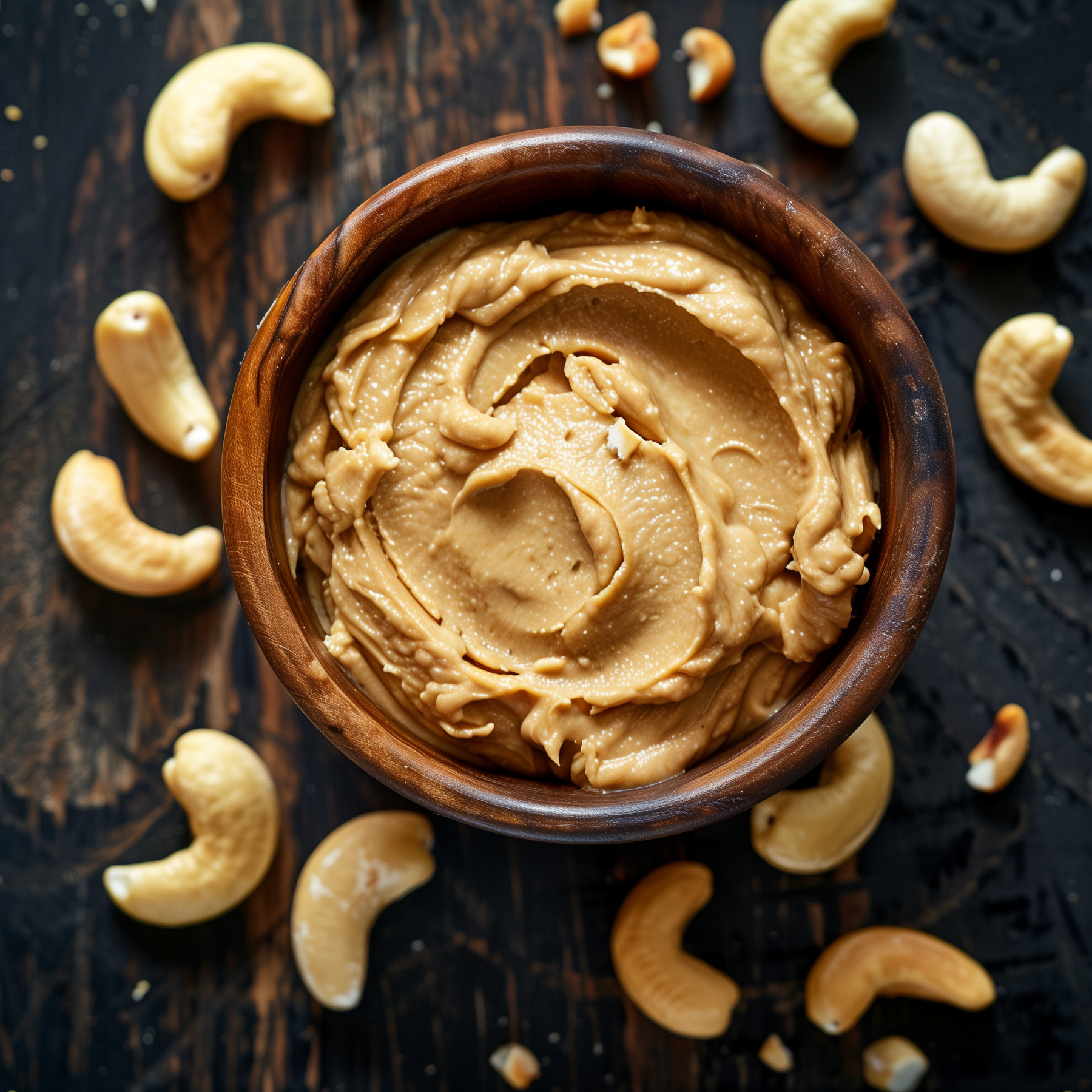
Why Cashew Butter is a Superior Alternative to Peanut Butter
In today's health-conscious world, making informed dietary choices is paramount. One such decision is selecting the right nut butter. While peanut butter has long been a staple in many households, cashew butter offers a plethora of benefits that make it a superior alternative. This blog post delves into the nutritional profile of cashews, highlights the drawbacks of peanut butter, and underscores why cashew butter should be your nut butter of choice.

Nutritional Profile of Cashews
Cashews are a powerhouse of essential nutrients, providing a balanced array of proteins, fats, carbohydrates, vitamins, and minerals.
- Calories: Approximately 553 calories per 100 grams.
- Protein: 18 grams per 100 grams.
-
Fats:
- Total Fat: 44 grams per 100 grams.
- Saturated Fat: 7.8 grams.
- Monounsaturated Fat: 23.8 grams.
- Polyunsaturated Fat: 7.8 grams.
-
Carbohydrates:
- Total Carbohydrates: 30 grams per 100 grams.
- Dietary Fiber: 3.3 grams.
- Sugars: 5.9 grams.
-
Vitamins:
- Vitamin E: 0.9 mg.
- Vitamin K: 34.1 mcg.
- Vitamin B6: 0.42 mg.
- Thiamin (B1): 0.42 mg.
- Riboflavin (B2): 0.06 mg.
- Niacin (B3): 1.06 mg.
- Folate: 25 mcg.
-
Minerals:
- Iron: 6.68 mg.
- Magnesium: 292 mg.
- Phosphorus: 593 mg.
- Potassium: 660 mg.
- Zinc: 5.78 mg.
- Copper: 2.2 mg.
- Manganese: 1.66 mg.
- Selenium: 19.9 mcg.

Health Benefits of Cashews
- Heart Health: Rich in monounsaturated fats, cashews help reduce bad cholesterol levels, thereby lowering the risk of heart disease.
- Weight Management: The combination of protein, fat, and fiber promotes satiety, aiding in weight management.
- Bone Health: High levels of magnesium and phosphorus support bone formation and maintenance.
- Antioxidant Properties: Vitamin E and other antioxidants in cashews protect the body from oxidative damage.
- Blood Health: Copper and iron are essential for the production and maintenance of red blood cells.
- Immune Support: Zinc and selenium enhance the immune system and aid in wound healing.
- Eye Health: Lutein and zeaxanthin protect the eyes from light damage.
- Brain Function: Magnesium supports brain function, mood, and cognitive performance.

Potential Concerns with Cashews
- Allergies: Cashews can cause allergic reactions in some individuals, ranging from mild to severe (anaphylaxis).
- Oxalates: High oxalate content can contribute to kidney stone formation in susceptible individuals.
- Portion Control: Due to their high-calorie content, it is essential to consume cashews in moderation to avoid excessive calorie intake.
Drawbacks of Peanut Butter
While peanut butter is a popular choice, it often comes with several nutritional drawbacks:
- Added Sugars: Many commercial peanut butters contain added sugars, which can contribute to various health issues such as obesity, diabetes, and heart disease.
- Hydrogenated Oils: To enhance shelf life and texture, some peanut butters include hydrogenated oils, which contain trans fats known to increase bad cholesterol (LDL) and decrease good cholesterol (HDL).
- Aflatoxins: Peanuts are susceptible to aflatoxin contamination, a toxin produced by Aspergillus fungi, which is a known carcinogen.
- Allergenic Potential: Peanut allergies are common and can be severe, making peanut butter unsuitable for many individuals.

Culinary Uses of Cashew Butter
Cashew butter is incredibly versatile and can be used in a variety of culinary applications:
- Snacking: Enjoy cashew butter spread on toast, fruits, or directly from the jar.
- Cooking: Use it in sauces, curries, and stir-fries for a creamy texture and rich flavor.
- Baking: Add cashew butter to cookies, cakes, and granola for a nutty twist.
- Dairy Alternatives: Cashew milk, cheese, and cream are excellent dairy alternatives for those with lactose intolerance.
- Nut Butters: Cashew butter is a creamy and nutritious alternative to peanut butter, offering a rich taste without the added sugars and hydrogenated oils.

Storage and Shelf Life
- Storage: Store cashew butter in an airtight container in a cool, dark place to maintain freshness. Refrigeration can extend shelf life.
- Shelf Life: Cashew butter typically lasts several months if stored properly and up to a year if refrigerated or frozen.

FAQ's
Q1: What are the primary nutritional benefits of cashew butter?
A1: Cashew butter is rich in essential nutrients, offering a balanced array of proteins, fats, carbohydrates, vitamins, and minerals. Key benefits include high levels of monounsaturated fats for heart health, protein for satiety and weight management, magnesium and phosphorus for bone health, and antioxidants such as vitamin E for protection against oxidative damage.
Q2: Why is cashew butter considered a better alternative to peanut butter in terms of health?
A2: Cashew butter is considered superior due to its lower content of added sugars and absence of hydrogenated oils, which are often found in commercial peanut butters. Additionally, cashews are less susceptible to aflatoxin contamination, a carcinogenic toxin common in peanuts. Cashew butter also offers a diverse range of vitamins and minerals beneficial for overall health.
Q3: Are there any potential concerns associated with consuming cashew butter?
A3: While cashew butter is nutritious, it can cause allergic reactions in some individuals, ranging from mild to severe. It also contains oxalates, which may contribute to kidney stone formation in susceptible people. Due to its high-calorie content, portion control is important to avoid excessive calorie intake.
Q4: How can cashew butter be used in cooking and baking?
A4: Cashew butter is versatile and can be used in various culinary applications. It can be spread on toast or fruits for snacking, incorporated into sauces, curries, and stir-fries for a creamy texture, added to baked goods like cookies and cakes for a nutty flavor, and used in dairy alternatives such as cashew milk, cheese, and cream.
Q5: How should cashew butter be stored to ensure its freshness and longevity?
A5: To maintain freshness, cashew butter should be stored in an airtight container in a cool, dark place. Refrigeration can extend its shelf life, typically lasting several months at room temperature and up to a year if refrigerated or frozen.
Referances
- NIH - Effects of Daily Consumption of Cashews
- NIH - Nut and Peanut Butter Consumption
- NIH - Plant based butters
For more insights into healthy eating and nutritious alternatives, subscribe to our newsletter or explore our range of nut butter products!

Leave a comment